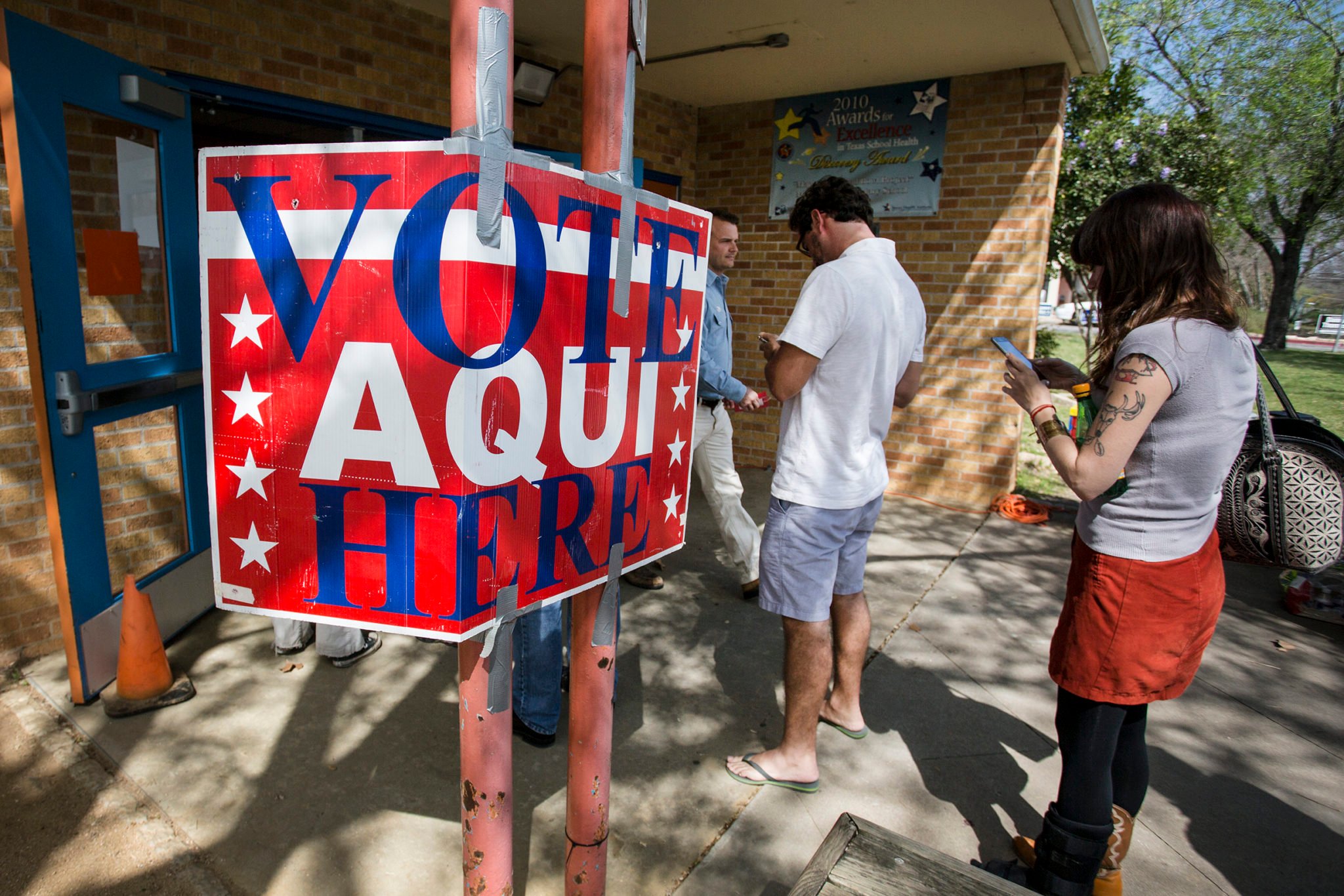
Automatic Voter Registration Could Add 2 Million Texans to the Rolls. That’s Why it Won’t Happen.
By maintaining one of the least accessible voting systems in the country, the Texas GOP has kept a demographically favorable electorate encased in political amber.

Above: A new report estimates that if Texas implemented an Oregon-style automatic voter registration law, the state could add more than 1.9 million eligible voters to its rolls.
“Texas isn’t a red state; it’s a non-voting state” is a political truism used frequently by Democrats to explain why they can win statewide — and also why they still always lose. The state consistently has one of the lowest turnout rates in the country, with just 42 percent of eligible voters coming out in 2016.
But the mantra isn’t quite right. It’s not just that Texas is a passive non-voting state. It’s actively an anti-voter state, thanks to Republicans who have in recent years passed a restrictive voter ID law and stringent regulations on the registration process. GOP leaders have successfully blocked any pro-voting reform efforts offered by Democrats (and even supported by some Republicans), such as same-day and online registration.
The voter suppression efforts, which are implicitly directed at groups more likely to vote for Democrats, are cloaked in concerns about George Soros-backed fraud, but in reality it’s all about power. By maintaining one of the least accessible voting systems in the country, the Texas GOP has kept a demographically favorable electorate — dominated by older Anglo conservatives — encased in political amber.
It’s not just that Texas is a passive non-voting state. It’s actively an anti-voter state.
While more conservative states like Texas, Alabama and Wisconsin have worked in every way to make it harder for young people and minorities to vote, Democratic states have instituted voting laws aimed at making it easier. Take, for instance, Oregon, which in 2015 enacted a law to automatically register eligible residents whenever they interact with the state DMV. The first-in-the-nation measure allowed the state to automatically register more than 225,000 residents to vote, nearly 100,000 of whom voted in the 2016 elections.
Taking similar steps in Texas would radically upend the existing political terrain. A report published Wednesday by the liberal think tank Center for American Progress estimates that if Texas implemented an Oregon-style automatic voter registration law, the state could add more than 1.9 million eligible voters to its rolls — about a 13 percent increase.
That casts a long shadow over the intensive on-the-ground registration work done by groups like Battleground Texas, which has only registered about 150,000 new voters in the past five years.
The report’s authors also mapped Oregon’s AVR turnout rates onto Texas — an admittedly imperfect comparison given disparities in voting trends — and found that nearly 700,000 of those newly registered voters were estimated to come out to vote. That’s just 200,000 shy of the margin that Donald Trump beat Hillary Clinton by here in 2016.
The state’s abysmal turnout would have been boosted by about 500,000 if it were to offer same-day voter registration, the report said. Texas lawmakers have gone the other way by requiring voters to present photo ID at the polls; the strict requirement conspicuously allows a handgun license but not state university-issued credentials.
Further, the report estimates that implementing online voter registration would have additionally boosted turnout by more than a quarter-million. (Texas is one of only about a dozen states that does not allow for online voter registration.)
“I think it’s about politicians who are afraid of more people getting involved in the process.”
Since Oregon’s automatic voting registration law was passed in 2015, 11 other states and the District of Columbia have passed similar measures. Not surprisingly, however, efforts to advance automatic and online registration legislation in the Texas Legislature have been blocked in recent years.
Some Republicans have used the specter of foreign hacking of digital voter registration databases as evidence that such a move would be too risky, even though the Texas secretary of state’s office has testified to the contrary. In May, a federal judge in San Antonio ordered Texas to allow drivers who are renewing their driver’s license online to also register to vote. The Texas Attorney’s General Office has appealed the ruling, hoping the conservative Fifth Circuit Court of Appeals will give a more favorable ruling.
State Senator José Menéndez, a San Antonio Democrat who filed an automatic voter registration bill in 2016, says resistance to voter expansion policies comes down to fear. “I think it’s about politicians who are afraid of more people getting involved in the process. They want to deal with the same people they always have.”
Policies such as automatic voter registration tend to activate the types of low-propensity voters — young people, poor people, Latinos, African Americans and other minority communities — who tend to lean to the left, the types of people Democrats need to tap into if they’re to have a political future. Which, of course, means that such policies have no chance of becoming law here so long as the Texas Republican Party’s power stems from its ability to delay and dilute the effects of the state’s rapidly shifting demographics.


